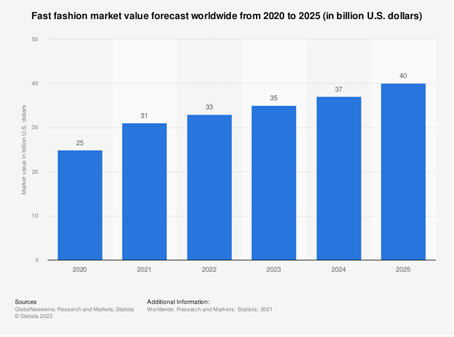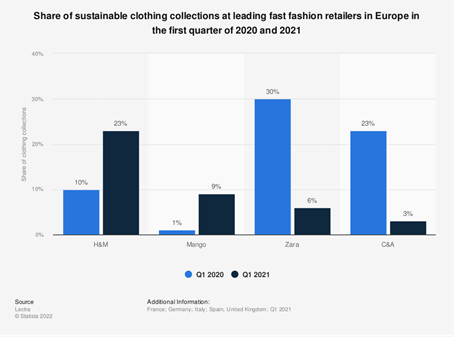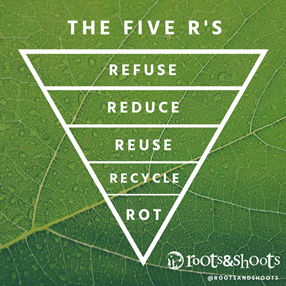Fast fashion is changing… Or is it?
The rise in eco-marketing and whether it’s backed by action
A Polluting Industry
Fashion is one of the most polluting industries with disastrous consequences on people and the planet.
According to a McKinsey report, the fashion industry was globally responsible for the emission of about 2.1 billion tons of greenhouse gas emissions in the year 2018, which was 4% of the global total emissions. To illustrate, this equals the combined greenhouse gas emissions of the countries Germany, France, and the United Kingdom.
One key role is played by the fast fashion sector specifically as it’s described by Investopedia:
Fast fashion is the term used to describe clothing designs that move quickly from the catwalk to stores to take advantage of trends
The harmful paradigm behind it is the speed in manufacturing, shipping, and consumption. Clothes are increasingly regarded as being disposable, to be worn a few times at most and in need of constant changing.
Thus, consumers purchase an ever-growing quantity of clothes each season, following various micro-trends to stay fashionable… Does this sound familiar? Naturally, this behavioral pattern does not come without a cost, as indicated by greenhouse gas emissions of the sector, but also social injustices due to the low-price pressures.
This is alarming, and it requires urgent action. Additionally, the global fast fashion market’s value is forecasted to be around 40 billion U.S. dollars in 2025. The fast fashion industry needs to change profoundly in order to somewhat sustainably satisfy consumer demands in the future.

Statistic forecasting the future value of the fast fashion market until 2025
Coming back to the environmental impact of fashion, the majority of emissions occur at the production and processing stages, while around 30% stem from the operations closer to the consumers, such as retail, the use-phase, and disposal.
Considering this massive problem, what are companies doing to improve?
For one, they are upping their eco-marketing actions. More and more, we can find taglines such as “green”, “eco-friendly”, “sustainable”, and many more on the clothes and storefronts.
For instance, looking at some of the major players in the fast fashion industry such as H&M, Zara, Mango, and C&A, some brands’ share of sustainable clothing collections increased between the first quarter of 2020 and 2021, but not for every company. In fact, Zara and C&A had a lower share of sustainability collections compared to the previous year, which is quite astounding.
However, while H&M had the highest share of sustainable collections -around 25%-, this raises the question of what constitutes sustainable clothing.

Statistic illustrating the share of sustainable collections comparing Q1 2020 to Q1 2021
Taking the example of H&M and their “conscious collections”, they claim that these clothes consider the planet by containing at least 50% of greener ingredients, naming the example of recycled polyester and organic cotton.
So, how sustainable are these ingredients really?
Generally speaking, cotton requires large amounts of water, but an LCA (life cycle assessment) found that the production of organic cotton for a basic t-shirt enabled saving 1,982 gallons of water in comparison to the chemical counterpart.
Moreover, organic cotton, compared to chemical cotton, is grown without fertilizers or pesticides. That raises another key issue with traditional cotton, namely the pollution, as certain chemicals may lead to low water quality and also harm the workers’ health.
However, nothing comes without downsides. According to a 2019 research paper, organic cotton creates less greenhouse gas emissions, but is rather environmentally inefficient compared to traditional cotton, indicating that more education and technical support is needed.
In any case, issues such as processing and dyeing are another topic, and may also be very resource intensive. So, sustainability claims are definitely not a simple matter and invite a lot of vague statements which are hard to back up.
One key shift which is urgently needed, actually lies in our hands
It’s up to us to change our purchasing habits when it comes to clothes. Chasing micro-trends is not only costly and draining for us, but it does the same thing to the planet and the people actually producing the shirt we wear once before the “donate” it.
Of course, there are always two sides to every story: fast fashion has the advantage of making clothes very accessible, no matter the budget, which allows people of all income levels to dress according to their fashion sense.
Also, purchasing brands that are at their core focused on sustainability, like Ecoalf and Armed Angels, is typically very costly. Therefore, so-called “sustainable fashion” excludes many people, even the young generations which are always going on about wanting to save the world. And even such green brands may face greenwashing accusations.
Last but not least, take care of logistics
Talking about Vintage and Wallapop…We are reusing clothes but the carbon footprint of sending a T-Shirt from Spain to Germany is crazy!…
What is the conclusion then?
Do we give up and continue business as usual, purchasing clothes every week and remaining within the cycle?
That is certainly an option, but not at all a viable one… If we want to continue living a pleasant life on earth, we cannot continue with our disposable mindset of clothes. We need to re-educate ourselves, and people around us to make changes.
For instance, we can follow the 5 Rs: refuse, reduce, reuse, recycle, and rot.
The importance is centered around refusing, reducing, and reusing – focus on these 3 Rs first to make the biggest impact.
Moreover, we can adopt a sharing mindset to clothes as well. We can look for options to rent clothing items rather than buying everything. For example, we can lease jeans for a monthly fee from Mud Jeans.
Have you ever tried this kind of clothing-leasing services?
All in all, we can observe that things are to some extent changing in (fast) fashion – but not at the rate that we need to truly achieve a positive net impact.
Fast fashion companies offering more sustainable options is a good development, but it is by no means enough. Their sustainability claims are not always backed by the necessary action in the supply chains, and fashion that is very fast can never be completely sustainable.
True sustainability requires a mindset shift, where we value clothing for all the work that has been put into it, often very far away for not even a living wage. It requires us to wear our clothes longer, to share them, rent them, to buy less, to buy more “sustainable”, and to make a lasting difference.
So, what tips can you take away from this article?
- Wear your clothes for longer and take good care of them
- Take good care of them, repair them before throwing items out
- Organize a clothing swap party with friends!
- Buy less clothes overall, stop following every “trend”
- Rent clothes – there’s a lot of companies now offering such services!
- If you do buy clothing, try to buy it from brands with transparency on their impact, and invest in basic, timeless pieces that suit your style!
Advertisement

Sources
- Fashion-on-climate-full-report.pdf (mckinsey.com)
- Fast fashion market value forecast worldwide 2020-2025 | Statista
- Fast Fashion Definition (investopedia.com)
- Fast fashion sustainable collections share Europe | Statista
- Conscious choice products explained (hm.com)
- A Quick Guide to Organic Cotton (goodonyou.eco)
- Quick Guide to Organic Cotton – Textile Exchange
- Sustainability | Environmental Efficiency of Organic and Conventional Cotton in Benin | (mdpi.com)
- ARMEDANGELS – Online shop for sustainable fashion
- Ecoalf – Sostenibilidad y estilo – ECOALF
- 5-RS-GRAPHIC.jpg (2000×2000) (janegoodall.org)
- Lease A Jeans – Product as a Service | MUD Jeans







This article raised many really important points.. I cringe when I think of all the clothes I used to buy completely new each season, but I feel my consumption has lowered a lot. But of course there is always more to do!
I read the article on fast fashion and seriously, are companies just pretending to improve? 🤔 #Greenwashing
Do you think fast fashion companies are actually making sustainable changes? Lets discuss!
I think fast fashion needs a complete overhaul. Companies need to step up!
Fast fashion is a toxic industry that values profit over people and the planet. Companies must prioritize ethical practices and sustainability, not just superficial changes. Its time for a revolution, not just a makeover. Lets demand real change, not empty promises.
Are fast fashion companies really making sustainable changes or just greenwashing?
Is fast fashion really changing or just greenwashing? Lets discuss! 🌿💭
Do companies really care about sustainability or is it just a trend?
Sustainability is not just a trend, its a fundamental shift in mindset towards responsible business practices. Companies may vary in their commitment, but those truly dedicated understand the long-term benefits for the planet and their bottom line. Its more than just a passing fad.
I think fast fashion brands need to step up their sustainability game.
Fast fashion brands care more about profit than sustainability. Its up to us as consumers to demand change by supporting ethical brands and buying less. Dont expect corporations driven by greed to suddenly prioritize the planet. It starts with us.